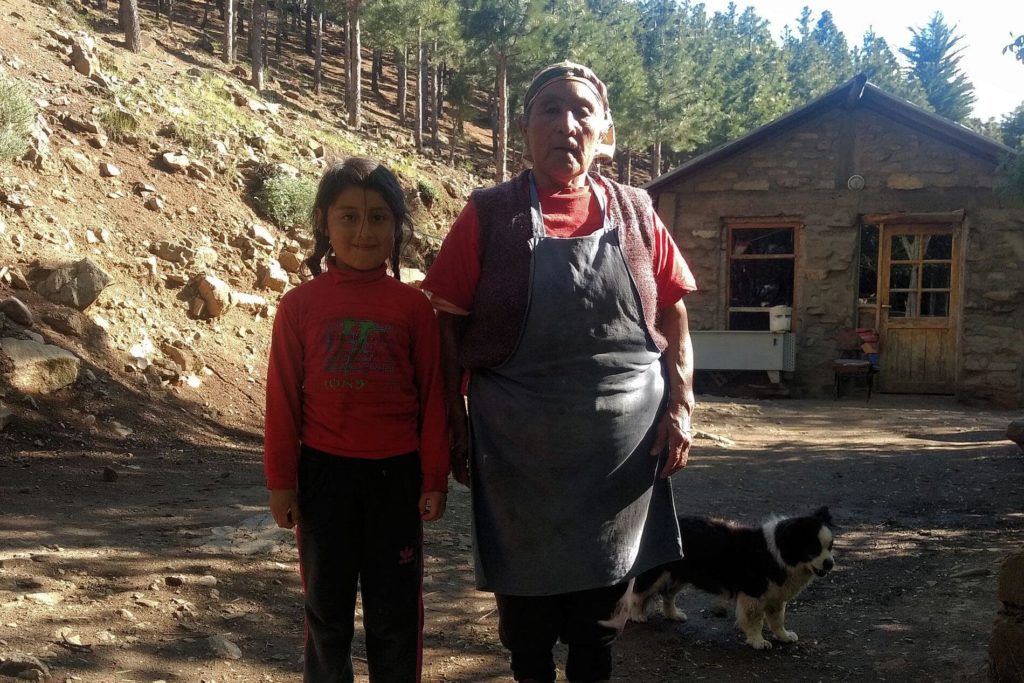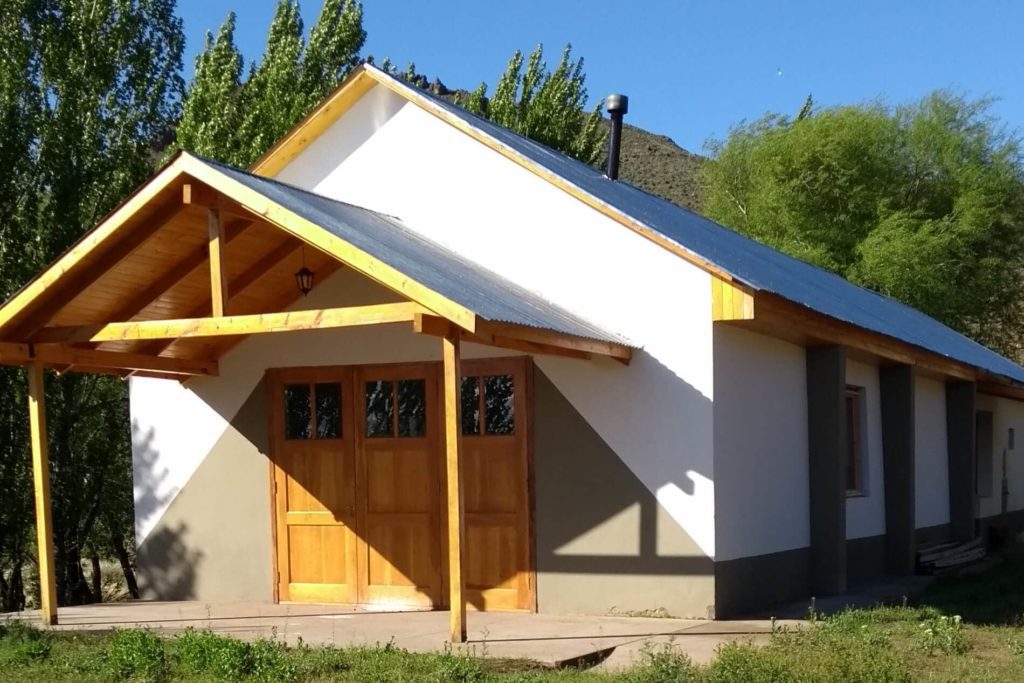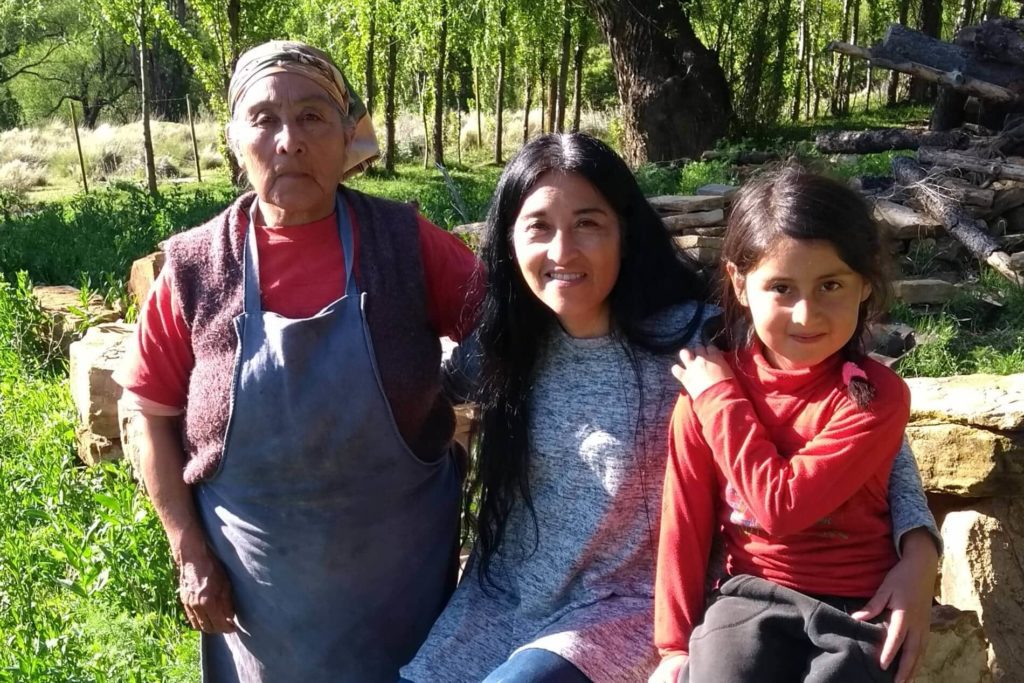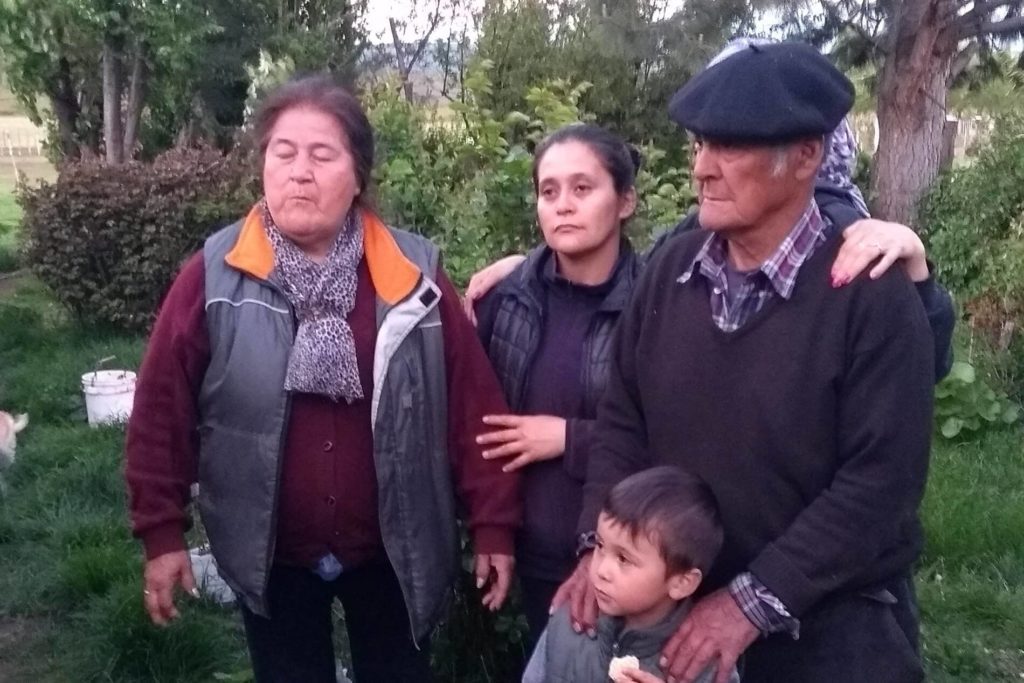This story was originally published in Intercontinental Cry on March 4, 2019. It was made possible with a grant from the Swiss human rights organization Incomindios.
Moira Millán is an award-winning Mapuche activist, screenwriter and author from Argentina. She is a leader in the movement to recover her people’s ancestral lands and the founder of the Movement of Indigenous Women for “Buen Vivir,” which advocates a way of life in harmony with nature. In her role as weychafe (traditional guardian, defender), she accompanied the victims of a police raid on the Mapuche community of Vuelta del Río in a peaceful protest at the courthouse in nearby Esquel. On June 26, 2018, only she was accused of two charges of aggravated coercion for her presence in the protest in Esquel. She went to trial on February 21 and now awaits her verdict. If she is found guilty, she could face two to four years in prison.
For more than 400 years, my people, along with the other indigenous peoples of Argentina, have been involved in a powerful struggle for self-determination. Even today, it persists in the memory of our ül, songs, and nüxam, stories, of the courage of our ancestors who defeated the greatest empire of the time. After its defeat, the Spanish Crown signed a treaty with the Mapuche in the first Parliament of Quillín, recognizing the sovereignty of the Mapuche nation.
Our Walljampu, Mapuche territory, stretches from the Pacific Ocean to the Atlantic Ocean, in what is now the Republic of Chile, whose name in mapudugun (Mapuche language) would be: Ngulumapu (Lands of the West). While in the current Argentina, Puelmapu (Lands of the East), our territory comprises almost half of what is now Argentina: from the south of the province of Mendoza in the west, to the south center of the province of Buenos Aires in the east, to the province of Santa Cruz in the south. It is estimated that we have a presence here of about 12,000 years, based on archaeological findings and studies of linguistic structure.
My people would remain independent across Walljampu until Chile seized control of Ngulumapu (Eastern Lands in the Mapuche Language) through a genocidal campaign known as the “Pacification of Araucanía” (1861–1883). Argentina carried out a parallel campaign in Puelmapu (Western Lands) with its “Conquest of the Desert” (1878 to 1885).
It was the first great extermination attempt; The Mapuche suffered a tremendous loss of land and life on both fronts; but the charge of colonization had only just begun.
After our defeat, the Argentine state took thousands of Mapuche families as prisoners, and auctioned them in the public square, disintegrating those families forever. In “The History of Argentine Cruelty,” Argentine historian Osvaldo Bayer recounts how the state publicly auctioned thousands of Mapuche families that were imprisoned during the occupation of Puelmapu. At least one official announcement was published in the newspaper El Nacional. It read, “… Today, Indians are given to every good family that requires them, they will be given a male Indian as a laborer, a female as a servant, and a child as an errand boy.”
Argentina also ran boarding schools as part of an assimilation plan that was written into Argentina’s 1853 Constitution. Like residential schools in Canada and the United States, Argentina’s boarding schools were designed as a weapon of cultural elimination and family disintegration. Mapuche children were forbidden to speak their language, Mapudungun; they were forced to assume a new, completely foreign identity; and they were subjected to numerous abuses and violations. This motivated Mapuche communities during the 1960s to demand the installation of schools within their territories, in order not to send their children to residential schools.
It was only in 1994 that Argentina replaced its indigenous assimilation directive with an article recognizing “the ethnic and cultural pre-existence of indigenous peoples” as well as the “community possession and ownership of the lands they traditionally occupy.” The constitutional reform was a step in the right direction, however, the Argentine state has a long way to go in parting ways with its cruel legacy.
My people are striving to pull Argentina the rest of the way.
At a time when great a women’s movement is emerging with tremendous force in Argentina, it is my hope to bring you closer to this complex political situation as seen from the perception of mothers.
Millions of feminist compañeras are claiming their rights as women in a parallel struggle of a nation for its self-determination. But I must ask about the role of Mapuche women in this process. Is there sorority with Mapuche women? Our right to maternity according to our own cosmovision is being crushed in our own territory.
The multiple oppressions to which we indigenous women are subjected are starting to be articulated and listened to by small strongholds against hegemonic society, but the world still knows little or nothing about us.
That is why, in a time of so much persecution and death, it is necessary to tell the stories that no one else has heard. I invite you to enter the humble rukas, houses, of the women who weave rebellion in this geographical space in the south of the world.
Para leer este artículo en Español, haz click AQUÍ
Three Generations, the Same Wait
I went to visit Segunda Huenchuano, a pillankushe (spiritual authority) from the Mapuche Lof (community) of Vuelta del Río in the department of Cushamen, province of Chubut, Argentina. Their neighbors are the Benetton Group, one of the world’s most widely known fashion companies. Benetton’s estate extends for thousands of kilometers, each day cornering the Lof more; Vuelta del Río suffers in body and spirit the dispossession not only of their lands but of their rights, including their right to educate their children in freedom.

As I approach her home, Segunda comes out to receive me hand-in-hand with her granddaughter. She has a broad smile as she invites me to her large but simple stone house that is almost empty of furniture. She begins to prepare some mate, stoking the kitchen fire with dry wood and reaching back into her memories.
In the 1960s, Vuelta del Río and other Mapuche communities decided that they no longer wanted to send their children to government-funded boarding schools.
“I remember that the school was being asked for since the year ’62 or ’63, in those years there were about 30 children. The grandparents of those children, they got together, and they said: How could they make a school where those children could learn?”
Segunda pauses, sips her mate gourd, “…and they said, ‘We are going to cut adobe.’ And they made a mixture of grass and mud and cut more than 3,000 adobes. With those adobes they raised the house on the bank of the river. At that time everyone had animals, so they sold animals; they bartered, and exchanged them for sheet metal and posts, and brought the wood for the roof. Once the building was done, they requested a teacher from the government, but the teacher never arrived.”
They waited until the day the walls collapsed – and they continued to wait until the government arrived to intern the children.
The young couples who did not want to send their children to the boarding schools were obligated to move to the nearest towns to ensure their children’s schooling. Finally, the mothers resolved to convene the assembly of the Lof, and raised the proposal to once again try to have a school established in the Lof.
The initiative was approved, and in 2016 they raised money and built a beautiful school building. In the process, they gained the support of Mapuche educational professionals, who prepared a bilingual cultural education proposal.

In 2016 the Lof Vuelta del Río built a beautiful school building, obtaining the support of Mapuche educational professionals, who prepared a bilingual cultural education proposal. However, the government ignored their proposal, and continues to require them to send their children to a government school in the Benetton ranch. Photo: Moira Millan
The project was presented to the provincial state and to be heard, they had to occupy the facilities of the education ministry of the province; but they never received an answer. Instead, the Argentine state financed the construction and start-up of a primary school within Benetton’s vast estate. The government covered all the costs, giving Benetton a free opportunity to school the children of their Mapuche laborers.
“From the time they’re very small, they try to indoctrinate our children, cultivating a feeling of gratitude and love towards the boss,” Segunda explained.
Inés Huilinao joins the conversation. She is the youngest daughter of Segunda, and she had to go through the painful ordeal of attending a boarding school. Now the mother of a five-year-old girl, Inés tells me that she had to leave home and move to the first aid clinic in order to send her own daughter to school, because it is the only place the school bus will pick up children.
When I asked Inés Huilinao why the government does not allow the community to build and operate a school of their own, she replied, “For me it is that they want us not to exist anymore in this place, in the territory. We are surrounded by the wire of these Benetton gentlemen, they think that we are a bother and they have to get us out of here in some way.”

For Inés Huilinao and other mothers like her, it isn’t just a matter of spending five days a week uncomfortably waiting at the clinic as their children attend school. It is also dangerous. The gendarmerie and the provincial police have militarized this place, committing abuses and excesses against the members of the community with total impunity.
The risk of institutional violence against children is latent. A number of parents have preferred not to school their children, because they are not willing to leave the community, nor expose them to unnecessary risks or traumas.
Inés recounts what happened on September 17th 2017, when Judge Guido Otranto ordered the investigation of several houses in the community, in an apparent attempt to locate the young artisan Santiago Maldonado, who went missing after taking part in a demonstration that was repressed by the gendarmerie on the edge of the Lof Resistencia Cushamen territory.
“I remember that morning; it was in the spring, and it was still dark,” said Inés. “We began to see planes flying, helicopters, lights and noise more than anything. We were all in bed. I told my girl not to get up, that nothing was happening, but she realized that something was happening because the lights were shining on us.”
The helicopters landed and dozens of gendarmes poured out, kicking in doors and dragging everyone out of their houses. They weren’t even allowed to get dressed or keep warm, even though the temperatures outside were freezing.
During this violent raid, a neighbor of Inés had his house burned, and there are witnesses who say that it was set on fire by the gendarmerie.
The neighbor is Veronica Fermin. Her husband, Marcelo Callfupan, is the traditional werken or spokesperson of the community. They have three children aged 8, 10 and 12 years, who were not inside the house because the whole family was returning from a protest in the city of Esquel. Had they been home, they could have died in the fire. Soon after this, the family moved to the town of El Maitén.
Post-Modern Feudal States
At first glance, Benetton may appear to be little more than an unwitting benefactor of Argentina’s largesse. However, the global fashion company has a clear role to play in the future of the resource-rich region of Patagonia – that is, Mapuche territory. Benetton is Argentina’s largest landholder and it has spent decades opposing Mapuche land rights.
In recent decades, Patagonia has also been populated by other billionaire neighbors including Joe Lewis, with more than 11,000 hectares; the Emir of Qatar, Sheikh Tamim Bin Hamad Al Thani, with 28,000 hectares; and Ted Turner with 36,942 hectares. This group of wealthy elite have created here a sort of postmodern feudal state, where their power decides Mapuche survival.
Benetton, however, is in a class of its own. It not only affects the administration of justice, such as in the case of Santiago Maldonado. It also imposes its own education policy as reported by Segunda Huenchunao and her daughter, Inés Huilinao. Additionally, the company has used its influence to host a sophisticated communication and security apparatus directly across from the estate. It is here that the Argentine state places its forces at the service of the company. Likewise, the municipal government of El Maitén, a village surrounded by Benetton’s barbed wire, protects the company’s interests.
The power of Benetton is felt at all levels of government. Despite this, the Mapuche Lof Vuelta del Rio resists – especially the women who refuse to be subjugated.
Thirty-five kilometers away, there is the Mapuche Lof Cañio. Although the Cañio community is not one of Benetton’s neighbors, they have suffered persecution and discrimination from the various sectors of power that support the company, since this community remains mobilized and in solidarity with other communities affected by the persecutory policy of the Argentine state.

As I approach the Lof Cañio, the steppe fades, the ocher and yellow disappear, and I find myself enveloped in green foliage. I arrived almost at dusk to the house of the Cañio family. From the top of the hill, I saw how the last flares of the day brushed the sky with orange and red hues. I am welcomed with affection and sit around the table with the women of the family who tell their truths.
This family suffers the persecution of the municipal government of El Maitén, which is trying to install a ski center on the family’s land. The development project would denude the mountains and damage the forest as well as the sacred spiritual spaces of the community.
The ecosystems in the Andes range are fragile in the face of the voracious advance of capitalism. But they have remained strong and firm in defense of the Mapu, Earth.
Javier Cañio, a young member of the community, was once accused of being an aggressor and kidnapper of a Benetton employee. Gladys Millane, Javier’s mother, her eyes moist from tears, recounts what happened the day the police arrived at her house in search of Javier.
“We were alone, my daughter Marilyn, my grandson and I. They arrived saying that they had to take Javier to the hospital to take a blood sample. In those days a Benetton laborer, who had been kidnapped, managed to cut one of the kidnappers with his knife, and they wanted to see if my son had any cut on his body so they could blame him. I was afraid that they would take him and hurt him or disappear him. I am always anguished, if one of my children is delayed in returning, I am always worried thinking that something bad has happened to them. I have no peace, I am afraid for my children.”
Marilyn, her youngest daughter, intervenes in the conversation. “I wonder if in those days my brother had hurt or cut himself working in the field, were they going to blame him for a crime he did not commit?! Because in the field you are always at risk of hurting yourself. Luckily, he was well, without scars or wounds.”
Mónica Cañio, her older sister, added that when she took her 3-year-old son to the doctor in El Maitén hospital and gave her last name, they refused to assist him. She is very concerned about the upbringing of her son. It is very important for him to grow up in his territory, strengthened in his identity; but she fears for the safety of the child and the rest of the family, since any assassinations of the Mapuche go unpunished.
Devalued Childhood
On November 23rd 2017, in front of Lake Mascardi, the Lof Lafken Winkul Mapu suffered a bloody crackdown by members of the federal police who arrested several Mapuche women and their children.
This Mapuche community, which consisted of four families, settled a parcel of land that is currently under the dominion of the Argentine government, through the National Parks. The authorities denounced the members of the community as usurpers, beginning an ongoing court procedure that has so far led to two attempts to remove them by force of judicial order. The excesses and abuses associated with this case have reached an alarming level of violence, including, among other crimes, the assassination of the 22-year-old Mapuche youth Rafael Nahuel.
Mariel Bleger, anthropologist and elementary school teacher, who arrived that day to express solidarity, testifies to me, still with eyes dampened by tears, what had happened. Mariel is the mother of a 5-year-old child and was pregnant with her second child. She has long accompanied the young Mapuche mothers who have been part of the decision to return to their territory, recovering this plot of land that is under the control of Argentine National Parks.
Mariel traveled to the region of the community. After five kilometers or so en route, she found a very large police deployment. There were at least eight vans and more than six police cars at the entrance to the territory. At that moment, Mariel recalls, there was also a group of about five women and two men with some children.
“I quickly recognized lying on the road toys and clothes of the boys and girls with whom I had worked in the school for several years,” said Mariel. “There were two boxes of fruit and vegetables trampled and scattered along the side of the road.
“I immediately asked for the children. None of the officers who were there wanted to give me information about their whereabouts, or their mothers. One of the trucks that was farthest on the route turned on his sirens and traveled the distance that ran through the police cordon. I could see that inside there was one of the children I was looking for. “
Mariel tells me that without noticing the danger, indignant and anguished by the fate of the children, she got into her car and followed the police van, meanwhile warning different human rights and union organizations by cell phone about the situation. The children were arrested and taken to the federal police, located on Tiscornia and Morales streets in the city of San Carlos de Bariloche.
Mariel continues her story, recalling one by one the details of that painful day: “I asked to enter to see the states of the children as their teacher. I was permitted to enter, and I found five women arrested and five minors. The children were still in shock because of the terrible situation they had just experienced with their mothers. Some of them were of nursing age, others wandering around that room and several of the women had lacerations produced by the beatings of the police. I asked them if they had been given water or food. None of this had happened. They were more than six hours delayed, unable to communicate with any lawyer, without letting the children go to the bathroom or eat something.”
Mariel asked permission to go out and buy food and water. It took more than two hours to give them the things she had purchased. Only at 11 pm that night were the children and their mothers allowed to leave. At no time did the children receive special attention because they were minors; in fact, they were continually harassed and limited in their mobility within the enclosure.
Despite multiple complaints from human rights organizations, schools and teachers in the city of San Carlos de Bariloche asking for explanations about the extreme illegality and violation of the rights of children and adolescents, no answers have been obtained. Two days after this event, the security forces returned to the occupied territory, killing the young Rafael Nahuel.
The list of tragedies and abuses seem to go on without end. Soon after the bloody repression of the Mapuche Lof Winkul Lafken Mapu, authorities stopped and apprehended four children: Awkan Colhuan, a year old; Kalfu Ray Colhwan Rosas, 2 years old; Calfulikan Colwan Jaramillo, 3 years old; and Daiana Antimilla, 10 years old. All of the children were detained and locked in a cell for at least 6 hours.
On Thursday, November 23rd 2017, the Lawyers Association of the Argentine Republic made a presentation to the prosecutor of the province of Río Nero in response to this incident that, like so many others, sought to break the will of a people in search of their freedom, but which only exposed the ferocity and the heartless racism of power.
Unfortunately, the mass mobilizations that rushed forward in support of the young Argentinean Santiago Maldonado were not repeated for the young Mapuche Rafael Nahuel or any of the Mapuche women and youth that have been forced to endure so many abuses at the hands of the government and their cronies.
But all is not lost. In the south of the world, we Mapuche women are discovering ourselves as beings rooted in our Ñuke Mapu (Mother Earth), and nourished by her power. Decolonization finds us tearing down the fences – not only those of the usurped territory, but also in our minds, in our consciences and, in particular, the Mapuche consciousness of maternity. We have measured the efficacy of ancestral medicine, prefigured an identity education, and recovered a natural and sovereign diet.
It is only a matter of time before the state finally recognizes that amplifying rights amplifies worlds.
Until that day comes, we endure.
This article was originally published on International Cry on March 4, 2019 and is reposted here with permission.
- Reflections from Mapuche Territory - June 4, 2020
- Native Flower Rebellion in Argentina - October 18, 2019
- Mapuche Motherhood in the Age of Benetton - March 7, 2019